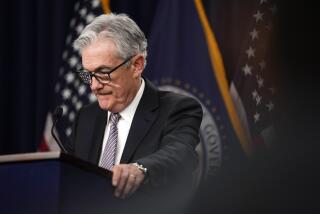China raises bank reserve requirement again; more tightening likely
- Share via
China’s central bank raised lenders’ required reserves Friday for the fourth time in just over two months, stepping up the fight against inflation that it has vowed will be a top priority for the year.
By forcing banks to lock up more cash with the central bank, Beijing hopes to drain excess money from the economy and tame rising prices, which it worries may stir social unrest.
The move, expected after China’s top leaders planted the task of taming inflation at the top of their agenda, underscores the central bank shift to what it called “prudent” monetary policy in December from its previous “moderately loose” stance.
With inflation expected to stay elevated in coming months, barring a dip in December from 28-month highs, analysts believe more tightening is in the cards.
“The rise is within market expectations, showing that the central bank is really concerned about inflation,” said Dong Xian’an, chief economist at Industrial Securities in Beijing.
“We expect the central bank to raise interest rates once or twice more in the first quarter.”
The 50-basis-point increase, effective Jan. 20, will raise the reserve requirement ratio for China’s biggest banks to a record high of 19.5%.
The move will drain about 350 billion yuan ($53 billion) from the Chinese economy, but given the speed at which new money is entering the system through trade and investment, it is no wonder that many analysts believe more reserve requirement increases are likely.
China’s foreign exchange reserves surged a record $199 billion in the fourth quarter to $2.85 trillion, compelling the central bank to counter the inflationary effects of such money inflows via sterilization, or selling yuan-denominated bills to domestic institutions to mop up excess liquidity.
The central bank has to buy most of the incoming foreign currency to keep the yuan stable, pumping huge amounts of local currency into the banking system as a result.
Yet it has faced difficulties in selling bills to banks in recent weeks because of depressed auction yields.
More to Read
Sign up for Essential California
The most important California stories and recommendations in your inbox every morning.
You may occasionally receive promotional content from the Los Angeles Times.













